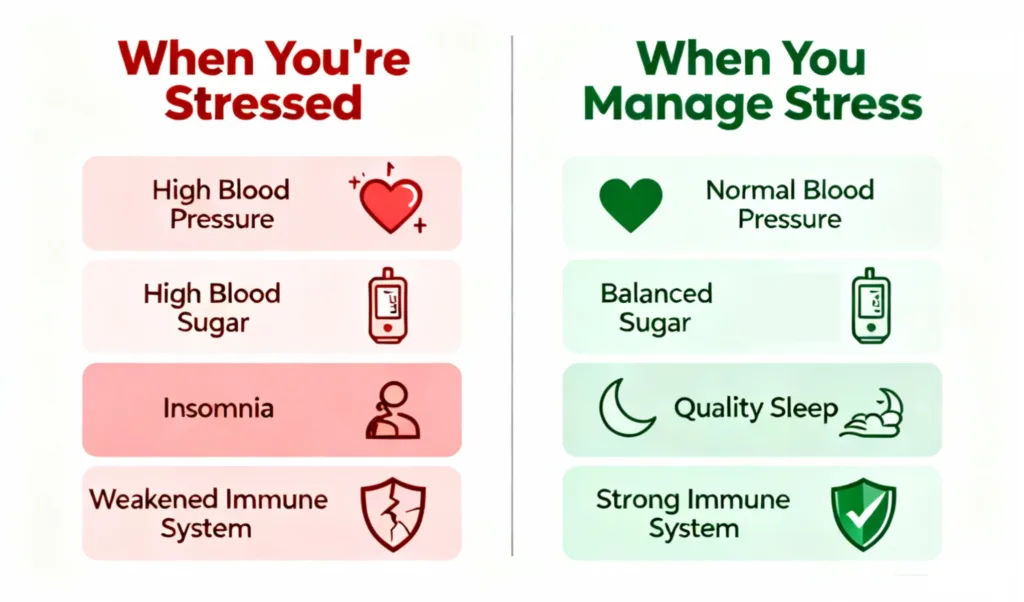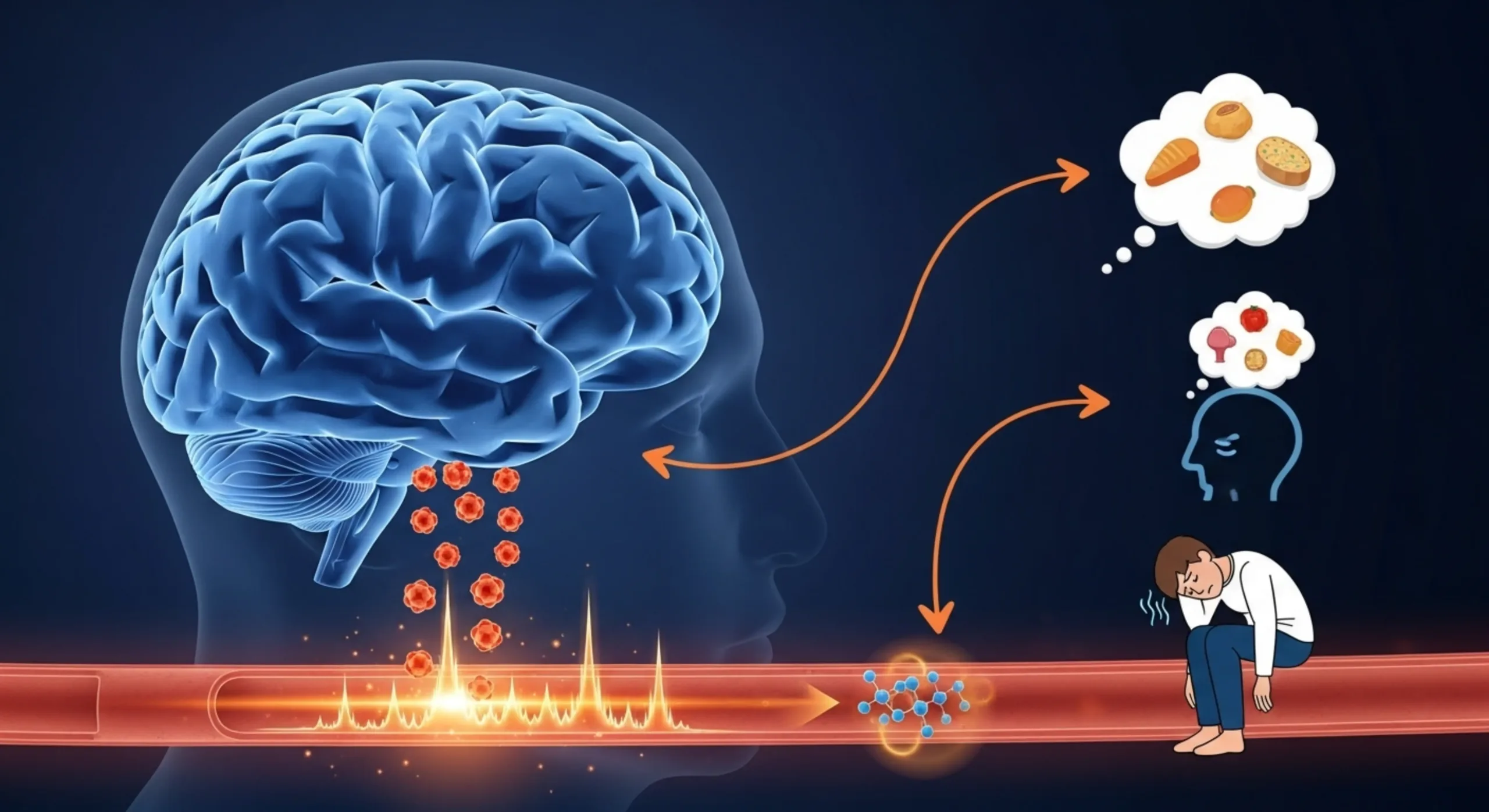Living with diabetes is already a daily balancing act. But what happens when emotional stress and diabetes collide? Research shows that stress doesn’t just make you feel overwhelmed — it can directly sabotage your blood sugar control, worsen insulin resistance, and increase your risk of complications. Understanding the hidden link between stress and diabetes is the first step toward breaking the cycle.
The Hidden Link Between Stress and Diabetes
When we think of diabetes, we usually imagine sugar, diet, or lack of exercise. But stress is often the “silent partner” making everything worse. Before you can manage your condition better, it’s important to understand how stress affects diabetes and why it matters. If you’re currently working on reversing diabetes, see our Diabetes Reversal Program.
How Stress Affects Blood Sugar Levels
When you’re under pressure, your body releases stress hormones like cortisol and adrenaline. These trigger the “fight or flight” response, causing stress-related blood sugar spikes by dumping glucose into your bloodstream for quick energy. For someone with diabetes, this surge can make blood sugar management much harder — the simplest way to understand how stress affects diabetes.
Impact of Chronic Stress on Insulin Sensitivity
Chronic stress leads to sustained elevations in cortisol and blood sugar. Over time, this creates stress-driven insulin resistance, meaning your cells stop responding to insulin effectively. This worsens type 2 diabetes, increases HbA1c levels, and contributes to weight gain — a key reason we often pair stress work with our Obesity Reversal pathway.
Mental Health and Diabetes: A Two-Way Street
Diabetes and mental health are deeply connected. Living with diabetes can cause anxiety, depression, and burnout. At the same time, emotional stress and diabetes fuel each other, creating a cycle of poor blood sugar control and declining mental well-being. For patients with hypertension too, stress can worsen readings — learn about our Hypertension Reversal.
Signs Your Stress Is Worsening Your Diabetes
Stress often hides in plain sight. Sometimes the body and mind send signals that your sugar levels aren’t only about food or medication. Let’s look at the tell-tale signs.
Physical Signs
Headaches, fatigue, high blood pressure, and frequent infections may signal stress is sabotaging your diabetes treatment.
Emotional Symptoms
Irritability, mood swings, sadness, or constant worry are red flags. These are classic signs of emotional stress and diabetes overlap.
Blood Sugar Instability
Unexplained highs and lows — despite following diet and medication — may point to stress-related spikes disrupting your progress.
How to Break the Cycle: Stress Management for Diabetics
The good news? Stress is manageable, and with the right steps, you can regain control. Stress management for diabetics is not about complicated routines but simple, daily habits that complement nutrition therapy and our Lifespan Extension approach.

Mindfulness and Meditation
Regular mindfulness practice lowers cortisol and blood sugar, making it one of the most effective stress management strategies for diabetes.
Deep Breathing and Guided Relaxation
Simple breathing techniques calm the nervous system, reduce cortisol and blood sugar surges, and prevent stress-related spikes.
Regular Exercise
Exercise reduces stress hormones, boosts insulin sensitivity, and improves mental well-being and blood sugar control. It’s essential for managing diabetes with lifestyle.
Journaling or Therapy
Writing down worries or working with a therapist helps process emotions, directly lowering stress and insulin resistance. For patients undergoing nutrition changes (including Anti-Cancer Diet Support or PCOS Management), structured mental health routines amplify results.
Adequate Sleep
Poor sleep raises cortisol, causing stress-linked blood sugar spikes. Quality sleep is vital for both stress relief and long-term sugar control.
What to Eat When You’re Stressed (Without Spiking Sugar)
Best Anti-Stress, Low-GI Foods
Opt for nuts, seeds, Greek yogurt, eggs, leafy greens, and berries. These foods help reduce cortisol and support mental well-being and blood sugar control.
Foods That Can Worsen Stress and Blood Sugar
Processed snacks, refined carbs, and sugary drinks increase stress and sugar spikes, leaving you more anxious and metabolically unstable.
Real-Life Success Stories: Managing Diabetes with Mind and Body
Many patients at Redial Clinic have reported improved HbA1c levels after combining dietary changes with stress-relief techniques. One patient lowered HbA1c from 9.2 to 6.8 within six months by practicing meditation, eating low-GI foods, and getting proper sleep — a typical outcome when lifestyle, nutrition, and stress care are aligned within our Diabetes Reversal framework.
How Redial Clinic Helps You Manage Stress and Diabetes Together
At Redial Clinic, Green Park, we combine nutritional therapy with stress management for diabetics. We use continuous glucose monitoring, personalized counseling, and relaxation methods to help you reverse diabetes while improving mental health. Our goal is simple: sustainable sugar control by addressing both body and mind. Explore Diabetes Reversal · Hypertension Reversal · Obesity Reversal.
FAQs About Stress and Diabetes
Q1. Can stress really raise blood sugar levels?
Yes — stress hormones (cortisol/adrenaline) trigger blood sugar spikes, making control harder.
Q2. How do I know if stress is affecting my diabetes?
Watch for emotional symptoms, fatigue, sleep issues, and unexpected spikes despite following your plan.
Q3. What is the role of cortisol in diabetes?
Cortisol increases glucose release and reduces insulin sensitivity, worsening blood sugar control.
Q4. What are the best ways to manage stress naturally for diabetics?
Mindfulness, therapy, exercise, and better sleep are proven strategies — we integrate these within our Diabetes Reversal Program.
Q5. Can managing stress improve my HbA1c levels?
Yes. Reducing stress can improve insulin sensitivity and stabilize glucose, leading to better HbA1c.
Q6. How can I track if stress is impacting my sugar levels?
Use CGM or frequent checks to map patterns of stress and blood sugar spikes; discuss trends in follow-ups.
Final Verdict
Stress and diabetes don’t just coexist — stress can actively sabotage your treatment. By understanding how stress affects diabetes, reducing cortisol-driven spikes, and practicing consistent stress management, you can take back control of both your physical and emotional health. Reversing diabetes is about diet and exercise — and also about healing mind and body together.
At Redial Clinic, Green Park, we specialize in personalized plans that combine nutrition, therapy, sleep hygiene, and guided relaxation. If stress is derailing your sugar control, this is the best time to act. Start here: Diabetes Reversal · Obesity Reversal · Hypertension Reversal.
References and Key Findings
| No. | Source | Key Findings |
|---|---|---|
| 1 | American Diabetes Association (ADA) | Stress can increase blood glucose by raising cortisol and adrenaline, directly worsening control. |
| 2 | Harvard Medical School | Chronic stress elevates cortisol and blood sugar, reducing insulin sensitivity and driving complications. |
| 3 | Journal of Diabetes Research (2021) | Mindfulness and relaxation interventions significantly reduce HbA1c in type 2 diabetes patients. |
| 4 | National Institute of Mental Health (NIMH) | Diabetes and mental health are interconnected; stress raises risks of depression, anxiety, and poor adherence. |
| 5 | Mayo Clinic | Sleep and physical activity reduce stress, lower cortisol, and help prevent stress-related spikes. |
| 6 | Redial Clinic Case Reports (Delhi, India) | Patients combining stress management with diet and lifestyle changes show faster HbA1c improvement. |






